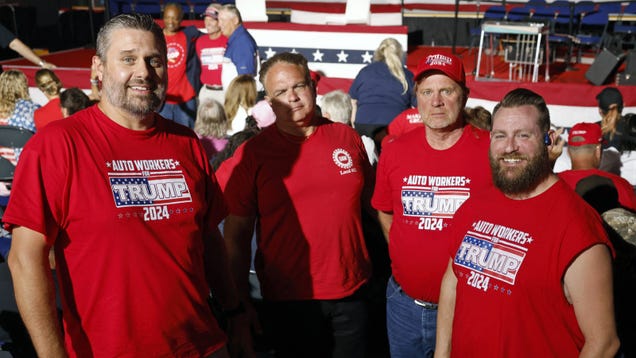Understanding the Complex Relationship Between Politics and Labor in America
The intersection of politics and labor has always been a contentious arena in the United States. Recent events, particularly political rallies, have highlighted the complexities of this relationship, especially as it pertains to the auto industry. A recent rally featuring supporters of former President Donald Trump showcased a group identified as “Auto Workers For Trump.” However, the authenticity of their representation has sparked significant debate. This article delves into the implications of political affiliations among labor groups, the authenticity of their messages, and the broader ramifications for workers in the automotive sector.
The Role of Political Rallies in Shaping Labor Narratives
Political rallies serve as a powerful platform for various groups to express their ideologies and support for candidates. They often feature catchy slogans and passionate speeches aimed at galvanizing support. The “Auto Workers For Trump” presence at a JD Vance rally in Detroit raises questions about the true representation of labor interests in political discourse. Are these individuals genuinely reflecting the sentiments of the broader auto worker community, or are they merely a vocal minority?
Research indicates that political affiliations among labor groups can significantly influence public perception and policy outcomes. A study by the Economic Policy Institute found that unions that align with specific political parties often face challenges in representing the diverse views of their membership. This disconnect can lead to skepticism among workers about the authenticity of their representatives, especially when their interests appear to diverge from the political narrative being promoted.
Examining the Authenticity of Labor Representation
The appearance of “Auto Workers For Trump” at a rally has prompted scrutiny regarding the authenticity of their claims. Critics argue that such groups may not represent the majority of auto workers, many of whom have expressed concerns about job security, wages, and working conditions under current political leadership. For instance, a survey conducted by the United Auto Workers (UAW) revealed that a significant portion of their members prioritize job stability and fair wages over partisan politics.
This discrepancy raises important questions about the motivations behind such political affiliations. Are these individuals genuinely advocating for the interests of auto workers, or are they being used as pawns in a larger political game? Understanding the dynamics at play is crucial for both workers and policymakers, as it can influence labor negotiations and the overall health of the automotive industry.
The Impact of Political Messaging on Labor Relations
The political landscape can have profound effects on labor relations, particularly in industries like automotive manufacturing, which are heavily influenced by government policies and economic conditions. The messaging surrounding political rallies can shape public perception and, in turn, affect the bargaining power of labor unions. For example, if a rally promotes anti-union sentiments, it could embolden employers to resist unionization efforts, ultimately undermining workers’ rights.
Moreover, the presence of politically charged groups at rallies can create divisions within the workforce. As labor organizations strive to unify their members around common goals, conflicting political messages can fracture solidarity. This fragmentation can weaken the collective bargaining power of unions, making it more challenging to advocate for better working conditions and wages.
Case Studies: The Intersection of Politics and Labor in the Auto Industry
Several case studies illustrate the complex interplay between politics and labor in the automotive sector. One notable example is the 2019 United Auto Workers strike against General Motors, which highlighted the critical issues of job security and fair compensation. The strike garnered significant media attention and public support, emphasizing the importance of solidarity among workers regardless of political affiliation.
In contrast, the recent rally featuring “Auto Workers For Trump” underscores the potential for division within the labor movement. As political narratives evolve, it becomes increasingly important for labor organizations to engage with their members and ensure that their voices are heard. This engagement can help bridge the gap between political ideologies and the genuine concerns of workers.
Navigating the Future of Labor Politics
As the political landscape continues to shift, the relationship between labor and politics will remain a critical area of focus. For auto workers and their unions, navigating this terrain requires a commitment to inclusivity and transparency. Engaging with members to understand their needs and concerns is essential for fostering a united front in the face of political challenges.
Additionally, labor organizations must be vigilant in countering divisive narratives that seek to undermine their collective power. By promoting a clear and consistent message that prioritizes workers’ rights and interests, unions can strengthen their position in negotiations and advocate effectively for their members.
In summary, the presence of groups like “Auto Workers For Trump” at political rallies serves as a reminder of the complexities inherent in the relationship between labor and politics. As workers navigate this landscape, it is crucial for them to remain informed and engaged, ensuring that their voices are heard in the ongoing dialogue surrounding labor rights and political representation.

